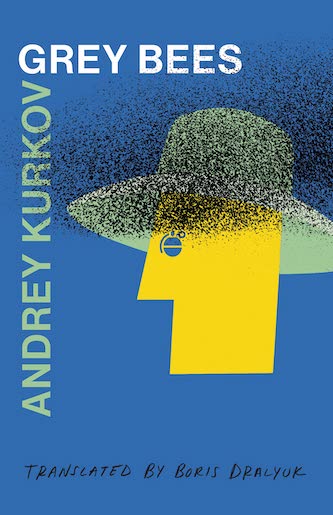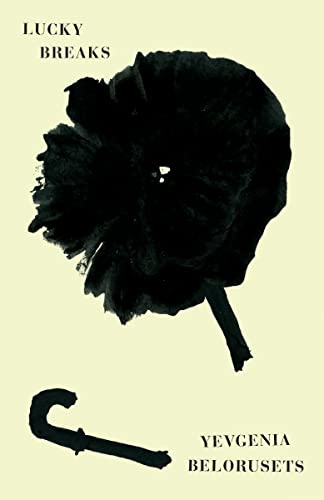Book Reviews: “Grey Bees” and “Lucky Breaks” — Civilian Life in Wartime Ukraine
By Preston Gralla
Neither book is primarily directly about the war itself. Rather, in sometimes oblique ways, they show the price paid by Ukraine’s non-combatant civilians.
Grey Bees by Andrey Kurkov Translated by Boris Dralyuk. 318 pp. Deep Vellum Publishing. Paper, $15.95.
Lucky Breaks by Yevgenia Belorusets. Translated by Eugene Ostashevsky. 186 pp. New Directions. Paper, $14.95.
 There’s an African proverb, “When elephants fight, the grass gets trampled.”
There’s an African proverb, “When elephants fight, the grass gets trampled.”
Over the centuries, plenty of grass has been trampled in Ukraine, which in the last hundred years has been one of Europe’s most fought-over battlegrounds. In just the period starting with World War I and ending with World War II, it’s been trampled by the armies of Poland, Germany, the Soviet Union, Russia, white Russians, Ukrainian socialists, and militias fighting for Ukraine independence.
And in all that time, as in most wars, it’s civilians – the grass – who have been trampled and suffered the most.
That’s particularly true regarding the ongoing invasion of Ukraine by the Russians, which started in 2014 with Russia’s illegal annexation of Crimea and occupation of Donbas in East Ukraine. Russia’s latest brutal invasion began in 2022 and civilians are not “collateral damage” – more often than not, they’re direct targets.
News media and social media have provided blanket coverage of the war, with some of the most visceral and horrific events recorded on video and posted for all the world to see. But, inevitably, the cameras will eventually move on to the next war. There will always be one; they’re as old as history and as fresh as the latest Instagram post.
The camera may move on, but people’s lives don’t. The long-term psychological damage done to the population often remains hidden. It’s the kind of damage that only literature can adequately capture – and for which literature can uniquely offer understanding and solace.
Ukraine has produced two great writers who chronicled war and its fallout: Isaac Babel’s Red Cavalry series of short stories in the 1920s detailed the post-World War I Russian-Polish War in which Ukraine was a central battleground; Vasily Grossman’s panoramic, majestic novel Life and Fate chronicled Germany’s second world war invasion of Russia and has been hailed as World War II’s War and Peace.
And now there are two more: Andrey Kurkov with his novel Grey Bees and Yevgenia Belorusets with her short story collection Lucky Breaks. Both books, recently translated into English, portray life in Ukraine in the aftermath of the war Russian waged against Ukraine in 2014.
Neither book is primarily directly about the war itself. Rather, in sometimes oblique ways, they show the price paid by Ukraine’s non-combatant civilians.
In Grey Bees Russian-born, Ukrainian-raised Kurkov tells the story of a Sergey Sergeyich, a gentle middle-aged beekeeper living in Donbas’s “gray zone,” a no-man’s land that sits between areas controlled by Ukraine’s military and by Russia and Russian-backed separatists. He’s unhappily divorced from his wife, rarely sees his daughter, and is one of only two remaining residents in a small town that has been shelled by both militaries, forcing everyone else but them to flee. The armies continue to take potshots at each other across the gray zone, with missiles occasionally landing in the almost deserted town.
In the midst of it all Sergey manages to build a life he can bear. But his bees can’t. The war and its missiles disturbs them too much; they need peace and well-tended fields and orchards to gather nectar so they and their hives can survive. So Sergey sets off on a quest across the lands held by Ukraine and Russia and Russian separatists to find suitable places for bees to do what bees need to do.
Through his travels, the contrast between the peaceful, cooperative, communal bees and the soldiers and war-supporting civilians couldn’t be greater. Kurkov’s message becomes increasingly clear: Bees live in harmony; man does the exact opposite.
Sergey isn’t a political man; he starts off making no distinction between the Ukrainians and Russians as he crosses the borders between Ukrainian and Russian-held territory. But he finds that the Ukrainians treat him and his bees with respect, while Russians and Russian separatists treat him and them with distrust, disdain, suspicion and worse. One nearly destroys the truck carrying his bees and his hives; Russian security officials constantly hound him, even sabotaging one of his hives, ultimately leading to the death of all the bees in it. There’s a hint that this goes deeper than the current moment, that something is diseased at the core of the Russian soul.
 Through it all the beauty of the hives and the way bees live in harmony keeps Sergey’s stubborn hope for a better life alive. That is, until the end. His journey is almost over, and he’s nearing his hometown. A lone, stray bee – an outsider – makes its way into one of his hives, looking for a safe home. A few seconds later three or four bees from inside the hive shove the intruder out.
Through it all the beauty of the hives and the way bees live in harmony keeps Sergey’s stubborn hope for a better life alive. That is, until the end. His journey is almost over, and he’s nearing his hometown. A lone, stray bee – an outsider – makes its way into one of his hives, looking for a safe home. A few seconds later three or four bees from inside the hive shove the intruder out.
“Why are you acting like people?” he bitterly asks them.
He makes a small home for the bee out of his fist, as if it’s a tiny hive. Once the bee is inside, he starts to clench his fist. The bee stings him and dies. Sergey starts to return to his nearly abandoned village. Even after what happened with the bee, he has some hope, because there is one other person still in the town. “Well, at least someone’s waiting for me,” he thinks.
The collection Lucky Breaks, made up primarily of brief two- or three-page stories, is more oblique than Grey Bees. Their depictions of war are hidden more deeply: we see no fighting, no Russians. The stories show, though, how deeply the war has embedded itself into people’s lives and souls.
In a note to the book’s preface Belorusets explains the stories “focus on the deep penetration of traumatic historical events into the fantasies and experiences of everyday life.” Those traumatic events, of course, are the ones caused by the war Russia began waging against Ukraine in 2014.
How deeply has the war affected Ukraine civilians? Consider the story “A Woman at the Cosmetologist.” Normally a visit to a beauty salon should be a refuge, a way to recharge and relax. But not here. We don’t know the woman’s history, but a few sentences give us hints of what she and other women have been through. The narrator writes: “Beauty salons are, in their own way, war trenches and dugouts. Soldiers hide in them, smeared with creams.”
Later in the story, the woman lays on a cosmetologist’s massage table and is told to relax while the cosmetologist starts to work on her. The narrator says: “Each touch of the cosmetologist’s hand felt like a blow or gunshot. Her skin was under bombardment; huge pores yawned open like the mouths of volcanoes.”
Many stories make no mention of the war, but there’s no need to; the effects are clear. Sometimes, though, the conflict is mentioned directly. In one tale a woman says: “When the war was going on I felt calm, because I was living from one shelling to another.” Another begins: “As far back as 2014, when everything was just beginning, a Ukrainian soldier would tell me he married war. He said, ‘I got married, imagine that, finally married.’”
All that’s not to say this collection is bleak. No matter the depth of the pain Belorusets portrays, she finds moments to show that humanity endures and can even triumph. In the story “The Woman Who Could Not Walk” a woman loses the ability to walk for no apparent reason. She sits for long periods doing nothing on a park bench. The narrator writes that the woman “would remain seated on the bench and every so often try to rise to her feet with a triumphant smile. Cold and warm winds played with white and red rose petals while the woman examined, with undisguised interest, those who were rushing around her; the other woman and people.”
Despite the war, life goes on, this story collection tells us. Despite the pain, flowers grow. People can still flourish.
Preston Gralla has won a Massachusetts Arts Council Fiction Fellowship and had his short stories published in a number of literary magazines, including Michigan Quarterly Review and Pangyrus. His journalism has appeared in the Los Angeles Times, Dallas Morning News, USA Today, and Boston Globe Sunday Magazine, among others, and he’s published nearly 50 books of nonfiction which have been translated into 20 languages.
